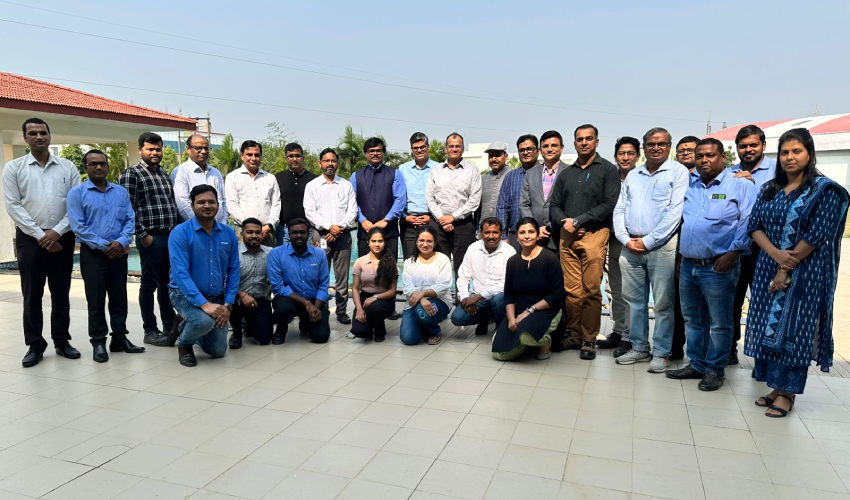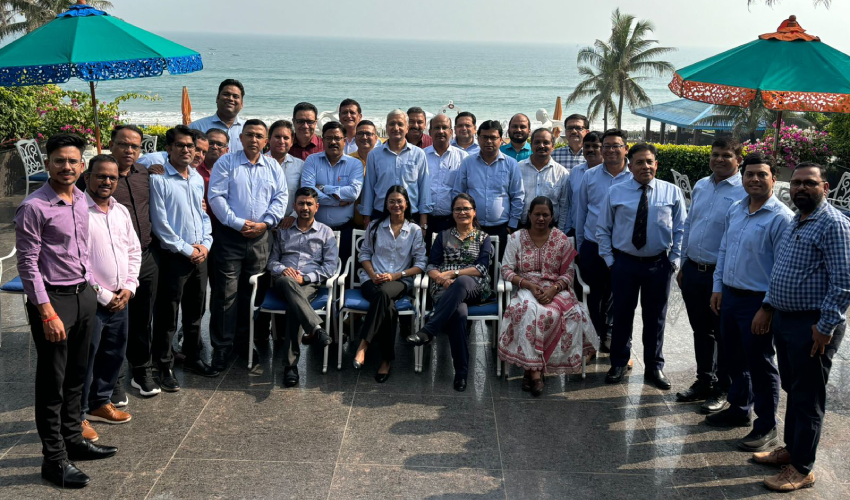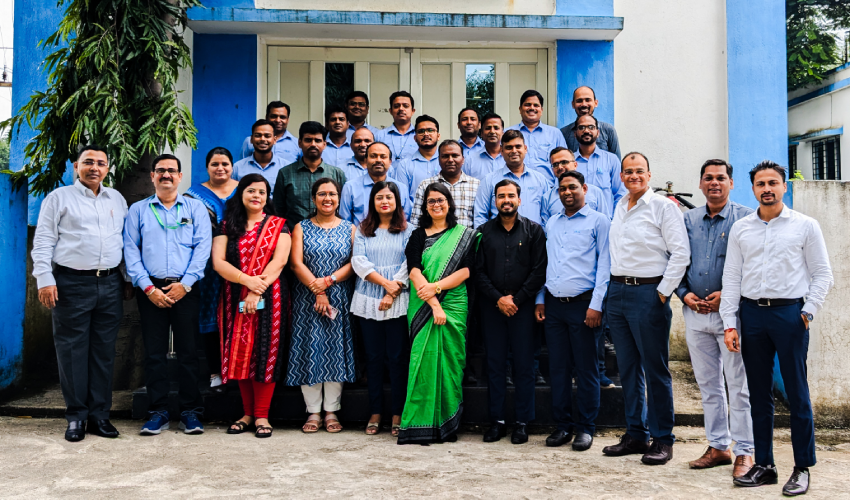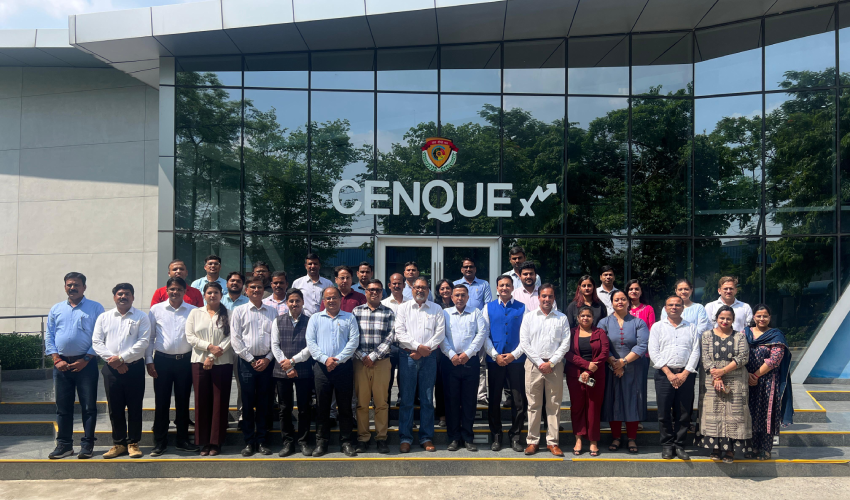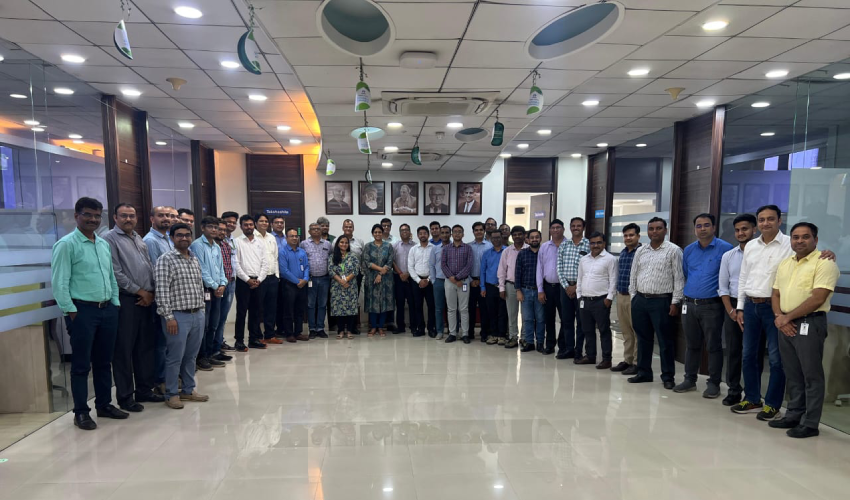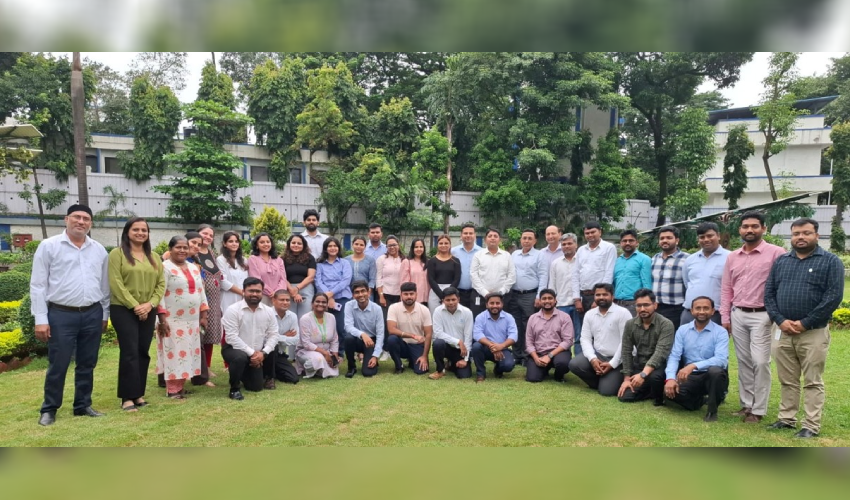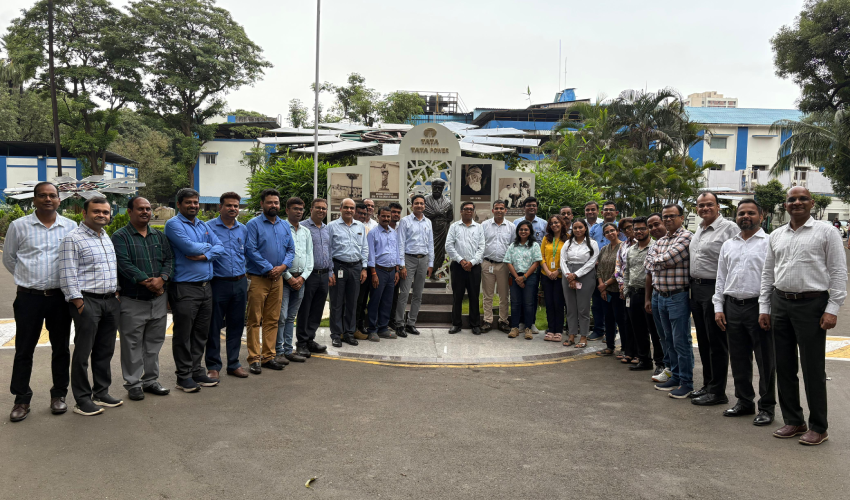Published on November 19, 2025
In every organisation’s excellence journey, there comes a moment when strategy must meet people—when frameworks need to be translated into everyday action, and when transformation becomes something employees can experience, not just measure. For Tata Power, that moment arrived with the launch of the Business Excellence Champions Programme (BECP 2.0) in FY2024.
Curated and delivered by the Tata Business Excellence Group (TBExG), BECP 2.0 transcends traditional competency development. It equips employees with a deep understanding of the Tata Business Excellence Model (TBEM 2.0), lead improvement projects, and become assessors who champion a culture of excellence across the enterprise.
For Tata Power, BECP 2.0 has become a strategic enabler in its organisational excellence roadmap. As of FY’25, 228 employees have been trained as Business Excellence Champions, and those who aspire to become TBEM assessors are invited to a 3-day Assessor Certification Programme (ACP) in FY’26.

This article captures a detailed conversation between the sponsor Ajit Maleyvar, Business Excellence Head, Tata Power, and the TBExG Competency Development team, highlighting the strategic intent, design, delivery, and impact of the BECP 2.0 initiative at Tata Power.
Q&A Conversation: Tata Power & TBExG
1. Strategic Alignment and Purpose: What strategic need led to Tata Power exploring the Champions Programme?
To ensure smooth adoption of the TBEM 2.0 framework across all entities and divisions of Tata Power—including the four Odisha discoms—it was imperative for us to build a strong pool of Business Excellence Champions. We recognised the need for broader employee coverage, encompassing both new employees (with less than two years of experience) and seasoned professionals, to enhance awareness of the Tata Business Excellence Model. A key component of the Champions Programme was the identification and implementation of Improvement Projects aligned with Strategic Business Objectives. The programme content was thoughtfully customised by TBExG, based on inputs from Tata Power, to reflect the organisation’s strategic priorities and focus areas.
2. How does this programme align with Tata Power’s long-term Performance Excellence/ Organisational Excellence roadmap?
The Business Excellence Champions Programme is a cornerstone of Tata Power’s Capability Building Strategy in Excellence. Since FY’25, 228 employees—including 38 from the Odisha discoms—have been trained as Champions, with many qualifying as Assessors. Two more Assessor Certification Programmes are planned in FY’26. Tata Power’s consistent recognition at the Tata group level in BEC 2023 and 2024 for Significant Efforts in Building Excellence Capabilities reflects the success of this strategy. With expansion across Renewables (4 GW manufacturing, solar rooftops), T&D (smart meters, utilities), and Generation (pumped storage, flue gas desulphurisation), the need for Business Excellence Champions has grown. Senior Leaders actively engage in BECP 2.0 workshops, sharing insights on TBEM’s relevance and setting expectations for Improvement Projects and workshop outcomes.
3. What role do you see TBExG playing in strengthening Tata Power’s excellence journey?
TBExG has been a key partner in Tata Power’s Excellence Journey through facilitation of Business Excellence, Data Excellence and Cyber Excellence Champions and Assessor programmes. From an awareness perspective, we’ve had around 5000 employees who have completed the Business Excellence Appreciation Module (BEAM) and an equal number of employees who have completed the online modules on the Tata Affirmative Action Programme (TAAP). Having said that, we have 200 plus employees who are trained Business Excellence Champions and Assessors.
4. Participant Selection and Representation
- What criteria were used to select participants, and how do they represent the future of excellence within the organisation?
- The employee should have completed the online Business Excellence Appreciation Module (BEAM).
- Employees should have a minimum work experience of 10 years (combined experience both within & outside the Tata group), with a keen interest and currently contributing to/participating in Business Excellence initiatives in their respective departments/divisions/entities to nominate themselves for the BECP 2.0 workshop. These employees are Excellence evangelists and once they qualify as Excellence Assessors, they will be ensuring that the TBEM 2.0 is followed as a way of life in day-to-day operations/work tasks.
- High potential employees who have attended fast-track leadership programmes in Tata Power.
- What kind of changes have you observed in the participants’ performance post the Programme?
The criteria for the participant selection are as follows-
As per feedback received from participants’ managers, it has been observed that the participants have begun to understand the linkages to their work through the key process categories of Strategy, Customer and Operations as per TBEM 2.0. Also, a culture of taking up improvement projects linked to strategic objectives as well as Daily Work Management have been further ingrained in employee mindsets.
85% of employees who have been part of fast-track leadership development programmes have been through the Business Excellence Champions Programmes. Also, there is a specific weightage assigned on understanding of the TBEM 2.0 framework & improvement frameworks as part of the criteria for employee promotions.
5. Programme Design and Delivery
- How was the programme structured to balance conceptual learning with practical application?
The programme was delivered in phases, beginning with pre-work to build TBEM 2.0 awareness and identify Improvement Projects. Theoretical sessions covered TBEM 2.0 concepts and Quality Tools, which were then applied to projects aligned with strategic objectives. Project progress was reviewed by senior leaders and TBExG, fostering accountability. These projects were integrated into Tata Power’s Continuous Improvement initiatives and showcased at internal, national, and international forums such as CII, ISQ, ASQ, and QCFI.
Examples of projects include sustainability initiatives such as reduction in freshwater consumption at Mundra Thermal Power Station, optimisation of raw water usage, and utilisation of ETP treated water to reduce service water consumption. Operational excellence projects like waste reduction in coal handling through VSM, module yield improvement activities, and reduction of module damages at project sites have been implemented. Reliability-focused efforts include improvement of Tail Race Power House generation, enhancing Bramhanvel Plant availability, and T&D Reliability Indices improvement in East Zone. Customer-centric projects such as EV charger installation turnaround time improvement, Mission 95 for billing efficiency, and reduction in voltage complaints for high-revenue customers demonstrate commitment to service excellence. Cultural and process initiatives like Ignite@SUJHAV, standardisation of CSR activities, and driving adoption of solar insurance further strengthen Tata Power’s transformation journey. - What were the most impactful elements of the curriculum in shaping participants’ understanding of the TBEM 2.0 framework?
Day-to-day examples from various scenarios from the business clusters with linkages to the TBEM 2.0 Process Criteria combined with applicability to their day-to-day work have been very useful in helping in the participants’ understanding of the TBEM 2.0 framework. Also, elements of ADLI, LeTCI have enabled the participants to understand the concepts of TBEM 2.0 better. Discussion of case studies through group exercises & presentations further enhanced the understanding of the concepts of the TBEM 2.0 Criteria. Discussions on Improvement Projects linked to strategic objectives through Cross-Functional Teams with diverse perspectives and inputs further added value to the learnings from the programme.
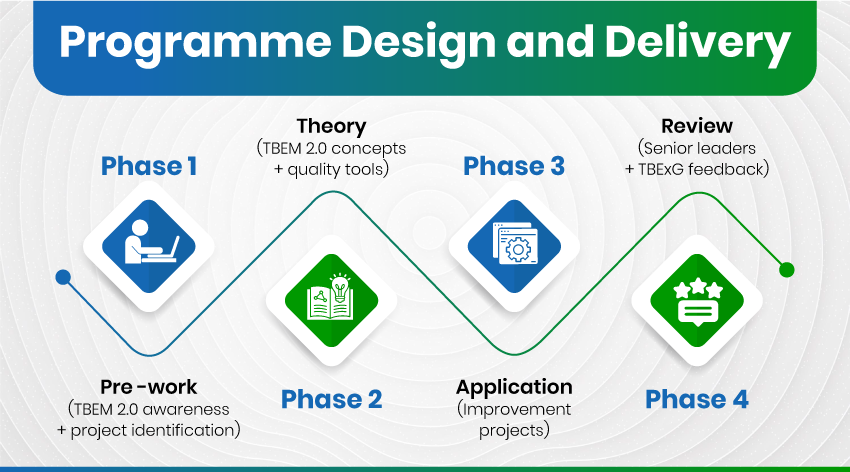
- How did the programme help participants internalise the use of quality tools and maturity concepts?
Quality tools have been used for working on the identified Improvement Projects to enhance the maturity of their work processes.
- How did the facilitators contribute to the learning experience, and what made their approach effective?
The facilitators had a very high level of engagement with the participants. The facilitators’ approach was made more effective based on their knowledge of various business clusters of Tata Power and sharing of appropriate examples enabled the participants to relate better to the concepts taught during the workshop.
6. Learning Challenges and Solutions
- What challenges did participants face in grasping the TBEM 2.0 criteria or applying them to their own functions?
There were minimal challenges in understanding the TBEM 2.0 criteria. In fact, the participants were able to relate to the TBEM 2.0 criteria and apply them to their day-to-day jobs.
7. Outcomes and Impact
- What kind of improvement projects or ideas emerged from the participants during the programme?
There were multiple improvement projects which were taken up—most of them on enhancing operational efficiencies with both tangible impact (cost savings/optimisation, increased productivity) as well as intangible outcomes (enhanced customer satisfaction, employee morale etc.) linked to organisational strategic objectives. - How has this initiative influenced/ enhanced the culture of excellence and continuous improvement at Tata Power?
The participants of the BECP 2.0 and then the ACP have been able to identify the relevance of the Tata Business Excellence Model with their day-to-day work tasks and jobs. As an outcome of the BECP 2.0 workshops, the participants have worked on improvement projects which have directly and positively influenced their departmental/functional Key Performance Indicators/measures. This initiative has also reinforced the culture of Continuous Improvement across a wider spectrum of employees.
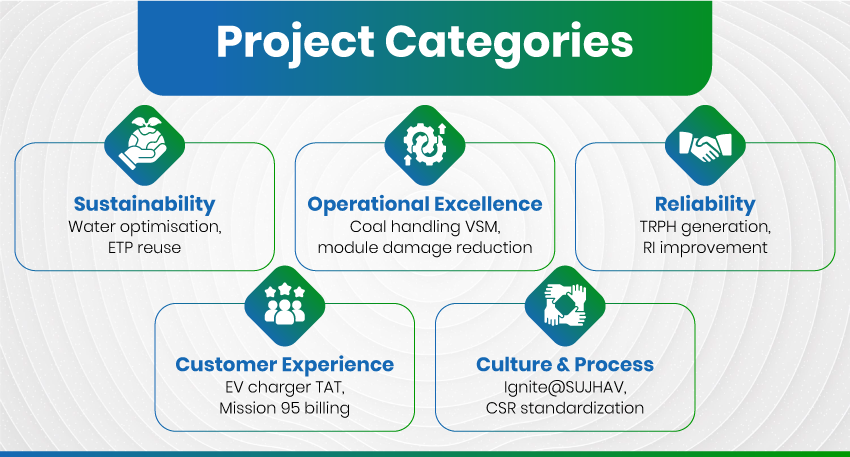
The projects delivered by champions have had a tangible impact on Tata Power’s operations. Sustainability initiatives have reduced water consumption and optimised resource use, while operational efficiency projects have streamlined coal handling and improved material management. Reliability improvements have enhanced generation performance and feeder stability, directly benefiting industrial and domestic consumers. Customer experience has improved through faster EV charger installations, accurate billing, and reduced voltage complaints. Collectively, these projects demonstrate how BECP 2.0 translates TBEM 2.0 principles into measurable outcomes including cost savings, improved reliability, enhanced customer satisfaction, and a stronger culture of excellence at Tata Power.
8. Sustainability and Future Direction
- What mechanisms are in place to sustain the learning and momentum generated by this programme?
The participants support the Business Excellence co-ordinators of their respective divisions/entities in driving Excellence initiatives and Continuous Improvement projects.
Initiatives such as Driving Excellence through TQM E&T Certification Courses, Creating Excellence Driving Workforce through EPM methodology, and Ignite@SUJHAV ensure capability building remains ongoing. Sustainability efforts like optimisation of water resources, monetisation of surplus power, and adoption of solar insurance for rooftop customers reflect Tata Power’s commitment to long-term environmental and operational excellence. With localised workshops and digital learning modules on Gyankosh, BECP 2.0 is poised to scale further, embedding excellence as a way of life across Tata Power.
- What feedback have you received from participants post-programme, and how will it shape future capability-building efforts?
The feedback received from this programme has been extremely positive with participants stating that they have moved from a state of wondering as to what the Tata Business Excellence Model is all about to understanding the relevance and applicability of the Tata Business Excellence Model to their day-to-day work. Localised deployment of BECP 2.0 workshops at multiple locations to maximise participation & minimise loss of productivity as well as travel time have garnered further positive feedback from the participants.
The BECP 2.0 has proven to be an effective mechanism for capability development on TBEM 2.0, and we would want to continue with more such workshops to ensure continuous Competency Development on the same.
- Why Other Group Companies Should Adopt BECP 2.0
The Business Excellence Champions Programme is more than a capability-building effort—it is a structured, scalable mechanism for embedding TBEM 2.0 into day-to-day work. Tata Power’s experience shows how a well-designed practitioners’ programme can cultivate internal capabilities, drive high-impact improvement projects, and foster a culture of continuous improvement across diverse business clusters.
Re-positioned as the Business Excellence Practitioners’ Programme (BEPP), this model offers Tata companies a proven pathway to build a future-ready workforce that that understands excellence, leads transformation programmes, and contributes meaningfully to TBEM and other group-wide capability agendas.
TBExG extends its appreciation to Ajit Maleyvar for sponsoring the initiative, and to Ranjit Ganguly and Neville Mistry for their coordination and support, along with Tata Power's senior leadership and facilitators who continue to drive this journey forward.
For more information on the BECP 2.0 programmes and other competency development programmes offered by TBExG, please reach out to Loveleen Mishra (loveleen.mishra@tata.com / +91 97714 41756) and/or Madhu Chaithanya (mchaithanya@tata.com +91 9884136878).



